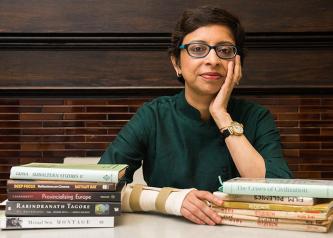

Professor, Departments of South Asian Languages and Civilizations and Cinema and Media Studies
Rochona Majumdar is a historian of modern India with a focus on Bengal. Her writings span histories of gender and sexuality, Indian cinema (especially art cinema and film music), the history of emotions, and modern Indian intellectual history. Her publications to date have challenged the assumption that arranged marriage is an antiquated practice by examining late colonial period Bengali marriage practices and analyzing the impact of postcolonial theory on historiography. Her third book, Art Cinema and India’s Forgotten Futures: Film and History in the Postcolony (Columbia University Press, 2021), is an analysis of global art cinema in independent India and of art cinema as a mode of doing history in a postcolonial setting.
Majumdar's strengths lie in the archives she assembles, ranging from matrimonial advertisements in nineteenth century Bengali newspapers to film society journals in multiple languages from early post-independence India. The ongoing pandemic has posed serious challenges to archival research. Nevertheless, in an ongoing collaborative project entitled Enlightenment in the Colony: Scholarship, Politics, and Intellectual Life in the “Hindoo/Presidency” College, Majumdar and her partners at Presidency University, Kolkata are working with a team of scholars to build a database containing a variety of archival documents about one of the oldest educational institutions in India. Majumdar is a diehard fan of Bombay cinema, especially the films of Shahrukh Khan and Zoya Akhtar.
Q: Why is international collaboration important in your field of study?
A: I work on India, which is a diverse and multilingual country. It is hugely beneficial to have multiple perspectives from different regions and time periods to understand Indian history and culture.
Q: How has your work with international partners been beneficial to you and your career?
A: My work, even as it focuses on India, is always comparative and global. My collaborations with scholars from different parts of the world and in different disciplines have enabled me to venture into new areas such as the history of cinema and the history of emotions.